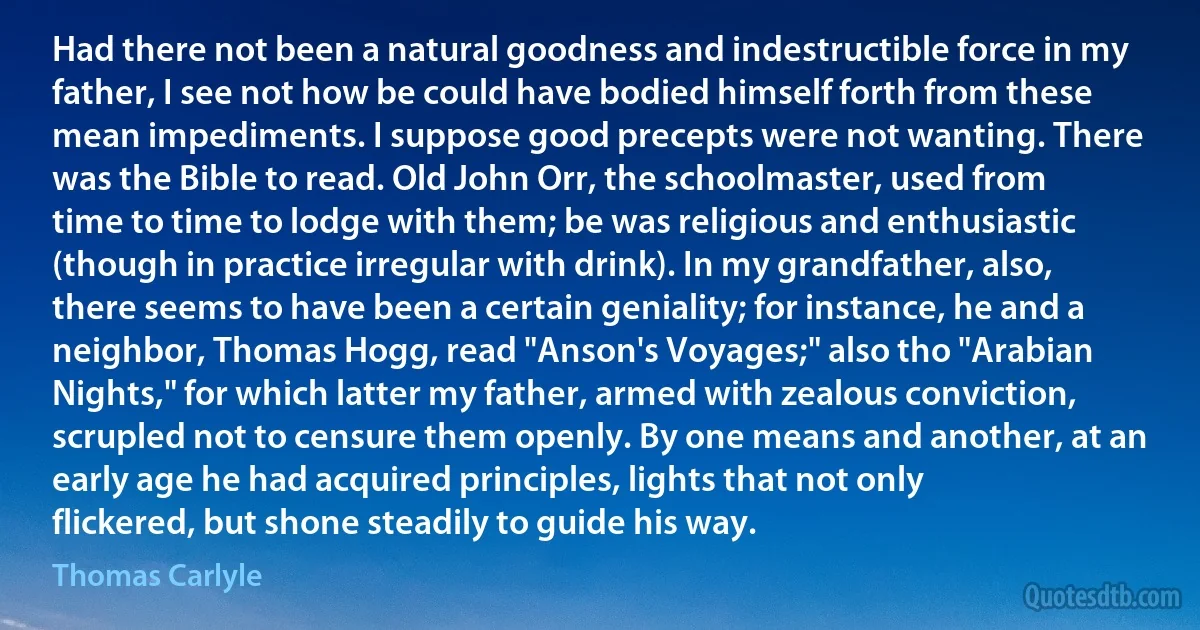
Had there not been a natural goodness and indestructible force in my father, I see not how be could have bodied himself forth from these mean impediments. I suppose good precepts were not wanting. There was the Bible to read. Old John Orr, the schoolmaster, used from time to time to lodge with them; be was religious and enthusiastic (though in practice irregular with drink). In my grandfather, also, there seems to have been a certain geniality; for instance, he and a neighbor, Thomas Hogg, read "Anson's Voyages;" also tho "Arabian Nights," for which latter my father, armed with zealous conviction, scrupled not to censure them openly. By one means and another, at an early age he had acquired principles, lights that not only flickered, but shone steadily to guide his way.
Thomas CarlyleRelated topics
age body certain drink early enthusiastic father force forth guide good goodness instance john mean natural neighbor practice read see shine suppose time wanting way means nightsRelated quotes
The people of England are loyal to the House of Hanover, not from a vain preference of one family to another, but from a conviction that the establishment of that family was necessary to the support of their civil and religious liberties. This, Sir, is a principle of allegiance equally solid and rational;-fit for Englishmen to adopt, and well worthy of your Majesty's encouragement. We cannot long be deluded by nominal distinctions. The name of Stuart, of itself, is only contemptible;-armed with the sovereign authority, their principles are formidable. The Prince, who imitates their conduct, should be warned by their example; and, while he plumes himself upon the security of his title to the crown, should remember that, as it was acquired by one revolution, it may be lost by another.

Junius
The science of the age, in short, is physical, chemical, physiological; in all shapes mechanical. Our favourite Mathematics, the highly prized exponent of all these other sciences, has also become more and more mechanical. Excellence in what is called its higher departments depends less on natural genius than on acquired expertness in wielding its machinery. Without undervaluing the wonderful results which a Lagrange or Laplace educes by means of it, we may remark, that their calculus, differential and integral, is little else than a more cunningly-constructed arithmetical mill; where the factors, being put in, are, as it were, ground into the true product, under cover, and without other effort on our part than steady turning of the handle. We have more Mathematics than ever; but less Mathesis.

Thomas Carlyle
Consent in virtue knit your hearts so fast,
That still the knot, in spite of death, does last;
For as your tears, and sorrow-wounded soul,
Prove well that on your part this bond is whole,
So all we know of what they do above,
Is that they happy are, and that they love.
Let dark oblivion, and the hollow grave,
Content themselves our frailer thoughts to have;
Well-chosen love is never taught to die,
But with our nobler part invades the sky.
Then grieve no more that one so heavenly shaped
The crooked hand of trembling age escaped;
Rather, since we beheld her not decay,
But that she vanish'd so entire away,
Her wondrous beauty, and her goodness, merit
We should suppose that some propitious spirit
In that celestial form frequented here,
And is not dead, but ceases to appear.

Edmund Waller
We hear everywhere about this false trade-off between freedom of speech and freedom of religion, as though there were some kind of balance to be struck here. There is no balance to be struck. Freedom of speech never infringes on freedom of religion. There is nothing I can say in this podcast about religion in general, or about Islam in particular, that would infringe upon someone else's freedom to practice his or her religion. If your freedom of religion entails that you force those who do not share it to conform to it, well that's not freedom of religion. We have a word for that – that's theocracy. This respect that we are all urged to show for "religious sensitivity" is actually a demand that the blasphemy laws of Islam be followed by non-muslims.

Sam Harris
The creationist is a sham religious person who, curiously, has no true sense of religion. In the language of religion, it is the facts we observe in the world around us that must be seen to constitute the words of God. Documents, whether the Bible, Qur'an or those writings that held such force for Velikovsky, are only the words of men. To prefer the words of men to those of God is what one can mean by blasphemy. This, we think, is the instinctive point of view of most scientists who, curiously again, have a deeper understanding of the real nature of religion than have the many who delude themselves into a frenzied belief in the words, often the meaningless words, of men. Indeed, the lesser the meaning, the greater the frenzy, in something like inverse proportion.

Fred Hoyle
